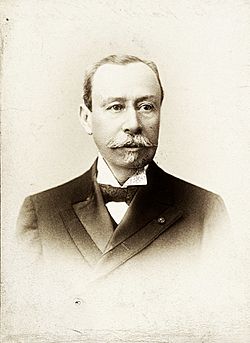Rafael Zaldívar facts for kids
Quick facts for kids
Rafael Zaldívar
|
|
|---|---|
 |
|
| President of El Salvador | |
| In office 1 May 1876 – 21 June 1885 |
|
| Preceded by | Andrés del Valle |
| Succeeded by | José Rosales Herrador |
| Personal details | |
| Born | 1834 San Alejo, Federal Republic of Central America |
| Died | 2 March 1903 (aged 68–69) Paris, France |
| Nationality | Salvadoran |
| Political party | Liberal |
| Occupation | Politician, diplomat |
Rafael Zaldívar (born in 1834, died in 1903) was an important leader in El Salvador. He served as the President of El Salvador for nine years, from 1876 to 1885. After his time as president, he also worked as a diplomat, representing his country in other nations.
Contents
Rafael Zaldívar's Early Life
Rafael Zaldívar was born in 1834. He decided to study medicine and traveled to Europe to learn more. After becoming a doctor, he started his career in the medical field.
From Doctor to Politician
In 1860, Zaldívar was given a special teaching job at the University of Guatemala. He taught subjects like philosophy and hygiene. After this, he decided to enter the world of politics. He was first elected to the House of Representatives, which is like a country's main law-making group. Then he became a Senator, and finally, he was elected president in 1876.
Big Changes in El Salvador
During President Zaldívar's time in office, many important changes happened in El Salvador. These changes were part of what people called "liberal reforms."
Land Reforms and Coffee
One of the biggest changes was about land. Before Zaldívar, some land was owned by groups of people or by communities. These were called ejidos and tierras comunales. President Zaldívar's government ended this system. They allowed these lands to be sold.
This change helped grow a lot more coffee in El Salvador. Coffee became a very important crop for the country. Many new farms were created on land that had not been used for farming before. This period is sometimes called the "Coffee Revolution" because of how much coffee farming grew.
Challenges and New Rules
Selling these lands, especially those used by Indigenous Salvadorans, caused some disagreements. Some people were not happy with these changes. To keep order, President Zaldívar's government created a special rural police force. This force helped manage the situation in the countryside.
End of His Presidency
President Zaldívar also made a big decision about Central America. There was an idea to bring back a unified country called the "Unified Central Republic." However, Zaldívar decided that El Salvador would not join this union.
In 1885, President Zaldívar was removed from power. This happened because of a military coup, which means the army took control of the government. General Francisco Menéndez then became the new president.
Later Life and Death
After his presidency, Rafael Zaldívar continued to serve his country as a diplomat. In the early 1900s, he was appointed as El Salvador's special representative to the United Kingdom. Later, he held the same important job in France. He passed away in Paris in 1903 while still working as a diplomat for El Salvador.
See also
 In Spanish: Rafael Zaldívar para niños
In Spanish: Rafael Zaldívar para niños
 | Lonnie Johnson |
 | Granville Woods |
 | Lewis Howard Latimer |
 | James West |

